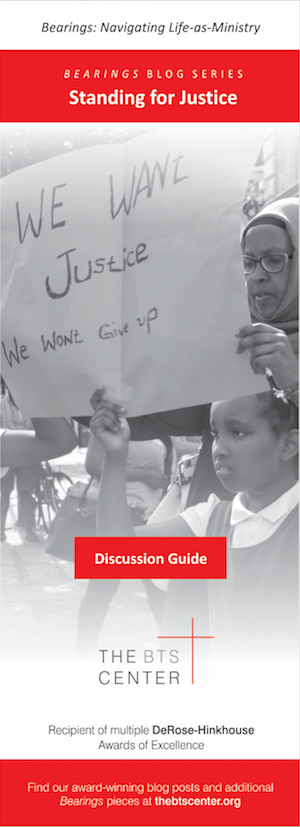Standing for Justice
 The BTS Center’s blog, Bearings: Navigating Life-as-Ministry, won a 2016 DeRose-Hinkhouse Memorial Award of Excellence1for its series “Standing for Justice: A Conversation on Race, Ministry, Leadership, and Congregational Life.”
The BTS Center’s blog, Bearings: Navigating Life-as-Ministry, won a 2016 DeRose-Hinkhouse Memorial Award of Excellence1for its series “Standing for Justice: A Conversation on Race, Ministry, Leadership, and Congregational Life.”
About the Series
The “Standing for Justice” series sought to promote dialogue about racism’s deleterious effects upon individuals, faith communities, and society as whole. It was written to provoke conversation about the normativity of whiteness in American culture, American churches, and in the narrative of faith—calling people of faith and the religious organizations they represent to a searing and fearless moral inventory in service of tackling structural and personal injustice.
The series consisted of four pieces, posted here in chronological order:
- “Anchor Babies and #MyAsianAmericanStory: Call(Out) and Response,” by Rev. Mihee Kim-Kort
- “September 11,”by Kelly J. Baker
- “Beyond Reconciliation: Race, Religion, and Reparations in the White Church,” by Joshua Crutchfield
- “Who Has the Right to Be Violent?”by Jamye Wooton
Commentary and Reflection Questions
By Pamela Shellberg, PhD
Each piece in this series is a challenge to respond with actions, not words—action issuing from serious reflection on complicity with oppressive systems and in the acknowledgment of privilege and all the goods accrued because of it.
They are calls to consider the moral obligation of the voluntary relinquishment of the goods of that privilege—in restitution and reparations—before reconciliation and justice can be fully served.
As you read each blog post in “Standing for Justice,” pay attention to your perspective as you read it. Do you receive it as if it was directed to you as an individual, as guidance for you as one person? Or do you read as if it was directed to a community of which you might be a representative?
Can you consciously shift your perspective? That is, can you read it as if it is written to “you,” singular? And then reread it as if it is written to “you,” plural? How do the questions and challenges of the piece change when you make the shift?
Where/How does the post’s author, in particular, challenge you (in the singular and in the plural) on the question of your complicity in systems that persist in denigrating, dehumanizing, and destroying non-white bodies?
What do you think is the most compelling or challenging point the author makes in the post? To what statements are you resistant?
About the Award
1The Religion Communicators Council(RCC) is a national interfaith association of religion communicators at work in print and electronic communication, marketing, and public relations. Through its DeRose-Hinkhouse Memorial Awards program, the RCC “recognizes the achievements of RCC members who demonstrate excellence as religion communicators.”

